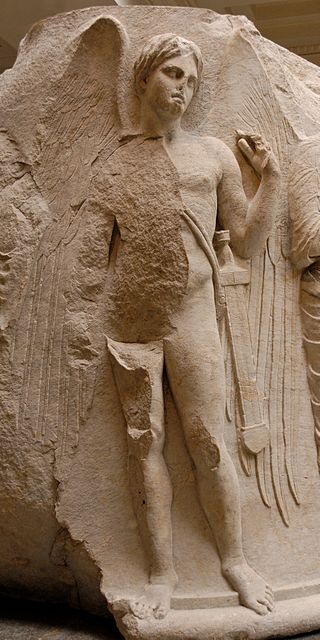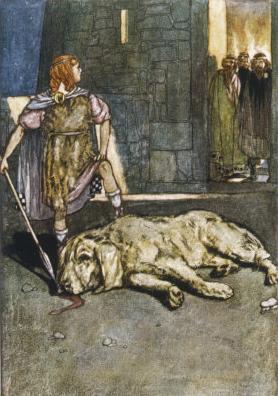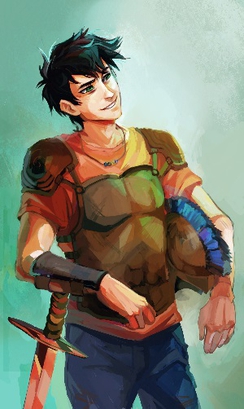Related Research Articles

Divinity or the divine are things that are either related to, devoted to, or proceeding from a deity. What is or is not divine may be loosely defined, as it is used by different belief systems. Under monotheism and polytheism this is clearly delineated. However, in pantheism and animism this becomes synonymous with concepts of sacredness and transcendence.

Castor and Pollux are twin half-brothers in Greek and Roman mythology, known together as the Dioscuri.
In Greek mythology, ichor is the ethereal fluid that is the blood of the gods and/or immortals. The Ancient Greek word ἰχώρ (ikhṓr) is of uncertain etymology, and has been suggested to be a foreign word, possibly the Pre-Greek substrate.

In Greek mythology, Thanatos was the personification of death. He was a minor figure in Greek mythology, often referred to but rarely appearing in person.

In Greek mythology, Pheme, also known as Ossa in Homeric sources, was the personification of fame and renown, her favour being notability, her wrath being scandalous rumours. She was a daughter either of Gaia or of Elpis (Hope), was described as "she who initiates and furthers communication" and had an altar at Athens. A tremendous gossip, Pheme was said to have pried into the affairs of mortals and gods, then repeated what she learned, starting off at first with just a dull whisper, but repeating it louder each time, until everyone knew. In art, she was usually depicted with wings and a trumpet.

In Greek mythology, Geras, also written Gēras, was the god of old age. He was depicted as a tiny, shriveled old man. Gēras's opposite was Hebe, the goddess of youth. His Roman equivalent was Senectus. He is known primarily from vase depictions that show him with the hero Heracles; the mythic story that inspired these depictions has been lost.

A dying-and-rising, death-rebirth, or resurrection deity is a religious motif in which a god or goddess dies and is resurrected. Examples of gods who die and later return to life are most often cited from the religions of the ancient Near East. The traditions influenced by them include the Greco-Roman mythology. The concept of a dying-and-rising god was first proposed in comparative mythology by James Frazer's seminal The Golden Bough (1890). Frazer associated the motif with fertility rites surrounding the yearly cycle of vegetation. Frazer cited the examples of Osiris, Tammuz, Adonis and Attis, Zagreus, Dionysus, and Jesus.

A demigod or demigoddess is a part-human and part-divine offspring of a deity and a human, or a human or non-human creature that is accorded divine status after death, or someone who has attained the "divine spark". An immortal demigod(-dess) often has tutelary status and a religious cult following, while a mortal demigod(-dess) is one who has fallen or died, but is popular as a legendary hero in various polytheistic religions. Figuratively, it is used to describe a person whose talents or abilities are so superlative that they appear to approach being divine.

Daimon or daemon originally referred to a lesser deity or guiding spirit such as the daimons of ancient Greek religion and mythology and of later Hellenistic religion and philosophy. The word is derived from Proto-Indo-European daimon "provider, divider ," from the root *da- "to divide". Daimons were possibly seen as the souls of men of the golden age acting as tutelary deities, according to entry δαίμων at Liddell & Scott. See also daimonic: a religious, philosophical, literary and psychological concept.

Apotheosis, also called divinization or deification, is the glorification of a subject to divine levels and, commonly, the treatment of a human being, any other living thing, or an abstract idea in the likeness of a deity.

Twins appear in the mythologies of many cultures around the world. In some cultures they are seen as ominous, and in others they are seen as auspicious. Twins in mythology are often cast as two halves of the same whole, sharing a bond deeper than that of ordinary siblings, or seen as fierce rivals. They can be seen as representations of a dualistic worldview. They can represent another aspect of the self, a doppelgänger, or a shadow. However, twins can also reflect a complete opposition of the other, such as the "civilized" Gilgamesh, and the "wild" Enkidu; or in the commonly known instance of good and evil twin identities.
Euhemerism is an approach to the interpretation of mythology in which mythological accounts are presumed to have originated from real historical events or personages. Euhemerism supposes that historical accounts become myths as they are exaggerated in the retelling, accumulating elaborations and alterations that reflect cultural mores. It was named for the Greek mythographer Euhemerus, who lived in the late 4th century BC. In the more recent literature of myth, such as Bulfinch's Mythology, euhemerism is termed the "historical theory" of mythology.

Hero cults were one of the most distinctive features of ancient Greek religion. In Homeric Greek, "hero" refers to the mortal offspring of a human and a god. By the historical period, however, the word came to mean specifically a dead man, venerated and propitiated at his tomb or at a designated shrine, because his fame during life or his unusual manner of death gave him power to support and protect the living. A hero was more than human but less than a god, and various kinds of supernatural figures came to be assimilated to the class of heroes; the distinction between a hero and a god was less than certain, especially in the case of Heracles, the most prominent, but atypical hero.
A theomachy is a battle among gods in Greek mythology. An early example is the Titanomachy, in which the Olympian Gods fought against the preceding generation, the Titans. The war lasted ten years and resulted in the victory of the Olympians and their dominion over the world. Another case is the Gigantomachy.
Athena is a fictional deity appearing in American comic books published by Marvel Comics. She is based on the Greek Goddess of the same name.

Perseus "Percy" Jackson is a fictional character, the title character and narrator of Rick Riordan's Percy Jackson & the Olympians series. He is also one of seven main protagonists of the sequel series The Heroes of Olympus, appearing in every book except The Lost Hero, and appears in the Trials of Apollo series, making him one of the few characters to appear in all three series of the Camp Half-Blood chronicles. He has also been a narrator and protagonist in Riordan's Greco-Roman/Egyptian crossover stories, part of the Demigods and Magicians collection. The character serves as the narrator in Percy Jackson's Greek Gods and Percy Jackson's Greek Heroes, also by Rick Riordan.

Greek mythology is the body of myths originally told by the ancient Greeks, and a genre of ancient Greek folklore, today absorbed alongside Roman mythology into the broader designation of classical mythology. These stories concern the ancient Greek religion's view of the origin and nature of the world; the lives and activities of deities, heroes, and mythological creatures; and the origins and significance of the ancient Greeks' cult and ritual practices. Modern scholars study the myths to shed light on the religious and political institutions of ancient Greece, and to better understand the nature of myth-making itself.

Roman mythology is the body of myths of ancient Rome as represented in the literature and visual arts of the Romans. One of a wide variety of genres of Roman folklore, Roman mythology may also refer to the modern study of these representations, and to the subject matter as represented in the literature and art of other cultures in any period. Roman mythology draws from the mythology of the Italic peoples and ultimately from Proto-Indo-European mythology.

A dying god, or departure of the gods, is a motif in mythology in which one or more gods die, are destroyed, or depart permanently from their place on Earth to elsewhere.

Themes of transformations are found in all types of mythologies and folklore. Greek mythology features a wide collection of myths where the subjects are physically transformed, usually through either divine intervention or sorcery and spells. Stories of shapeshifting within Greek context are old, having been part of the mythological corpus as far back as the Iliad of Homer. Usually those legends include mortals being changed as punishment from a god, or as a reward for their good deeds. In other tales, gods take different forms in order to test or deceive some mortal. There is a wide variety of type of transformations; from human to animal, from animal to human, from human to plant, from inanimate object to human, from one sex to another, from human to the stars (constellations).
References
- ↑ "Greek mythological figures: Deified mortals – Four Corner Ministries (4CM)". fourcornerministries.com.
- ↑ "Immortals - Greek Mythology Link". www.maicar.com.